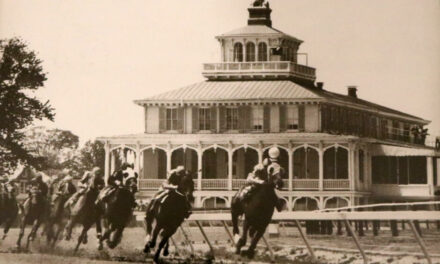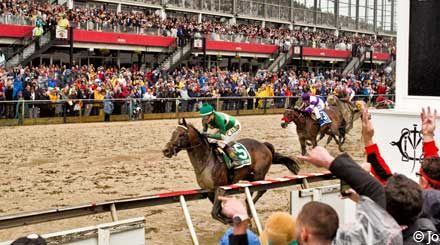Tonight, the Anne Arundel County Council will hear public comments on County Bill #75-16 for Zoning and Compost Facilities, a bill that many horse farm owners and managers would like to see pass, as it would that would permit a state-of-the-art composting facility designed to accept horse manure mixed with a small amount of food waste.
However, many county residents are opposing this bill, and are expected to come out en force against the bill tonight.

Regulations such as these, which prohibit horse manure on trails, combined with opposition to legislation such as the current composting facilities bill, have residents frustrated at the increasing “un-friendliness” of Anne Arundel County.
Testifying for the bill tonight will be Steuart Pittman, who along with his family, owns and operates the 550 acre Dodon Farm in Davidsonville. Recently elected as vice-president of the Maryland Horse Council, Steuart Pittman also serves as a director on the Anne Arundel County Farm Bureau and is a District Supervisor of the Anne Arundel County Soil Conservation. Below is his testimony – and he is encouraging everyone in Anne Arundel County who supports this legislation to either attend tonight’s meeting or let the council know.
Meanwhile, The Equiery wants to know: does your county have composting facilities that accept horse manure from off-site? Have there been complaints from neighbors? Please email us as editor@equiery.com
Anne Arundel County, if it values its farmers and its environment, needs to support composting facilities and support Bill 75-16.
A top priority of the Maryland Horse Council Farm Stewardship Committee, working closely with Chesapeake Bay Foundation and other environmental advocates, has been to facilitate the establishment of regional manure composting facilities.
Large horse farms have the space and equipment to compost and spread manure in accordance with the Nutrient Management Plans and annual reports that they file with the Maryland Department of Agriculture. Small farms must remove manure from their premises.
In 2014 environmental advocates and the agricultural community collaborated to establish state regulations for the permitting of composting facilities that accept waste from off-site by Maryland Department of the Environment (MDE). The goal was to ensure that composting take place in a manner that prevents nutrient runoff, protects nearby residents from nuisance, and ensures that the final product is safe for end users. The 18-page MDE Permitting Guidance was published June 12, 2015.
Our county’s farmers and clean water advocates alike were proud when the Maryland Department of Agriculture announced that a grant was awarded to Veteran Compost and 02 Compost to construct a state of- the-art composting facility here. We have 4,500 horses on 950 different properties in this county producing 81 million pounds of manure annually, and we have more shoreline than any other county in Maryland. Our Soil Conservation District effectively monitors manure management to mitigate waterway contamination, but cannot require every horse property to operate its own composting program. The state is investing $350,000, and a business from outside the county is investing another $200,000 to partner with our beloved Homestead Gardens to protect our waterways from the threat of poor manure management. The project will not only practice and demonstrate state of the art composting practices, but will also provide educational programs for farmers and the public in those methods.
Anne Arundel County lost 8,327 acres of farmland between 1997 and 2012, according to the USDA agricultural census. The only large sector of agriculture that has grown here is the horse industry. As grain and cattle farmers have moved to farm-friendly places like Iowa their farms have either been sold to developers or become equine operations.
While elected officials and the public in our county have consistently expressed a desire to preserve farmland and open space, zoning and permitting laws here make modernization of farming practices a challenge. Our grading permit law has no agricultural exemption, so farmers must hire urban engineers to design plans for work on farms while also complying with state regulations through our Soil Conservation District. Our industrial impact fee law has no agricultural exemption, giving the Office of Planning and Zoning authority to assess farm operators whenever they expand or initiate new farm activities. Our Animal Control law allows Animal Control officers to demand that shelters be constructed in pastures even when adjacent barns have stalls where animals are protected from weather. It would be hard to make the case that this is a farm-friendly county, but we can change that.
The fact that Anne Arundel County’s zoning law makes no mention of composting facilities as a permitted use is not surprising. The state only started regulating them separately from other agricultural practices last year. What is very surprising is that any resident or elected official would oppose the simple legislation offered by Councilman Jerry Walker to allow composting facilities as a conditional use in RA (Rural Agricultural) districts.
Walker’s bill does not affect the vast majority of composting that takes place on farms, businesses, and residences throughout the county, whether it involves manure, food scraps, or animal carcasses. Instead it recognizes the fact that the state of Maryland has created a rigorous permitting program for composting operations that accept materials from places that do not have the capacity to compost on-site. The bill allows these facilities to exist in our county, but only under specific conditions and only in RA districts. No facilities would be allowed without first obtaining the MDE permit.
Community opposition has already forced the county council to amend the bill to ban the composting of animal carcasses from local farms (a practice advocated by environmental and agricultural organizations worldwide and something that farms in our county need), and to limit the size of the facility to under ten acres, so if the proposed facility on Governor’s Bridge Road is a success its operators will need to establish a second location elsewhere even though it is on a 103-acre farm.
This is yet another example of the parochial NIMBY (Not In My Backyard) phenomenon. Those complain about the prospect of a farm doing what farms do – who are the same people who moved next door to a farm because of its rural flavor. They love driving by the farms and they hate traffic. They love that their children can take riding lessons just a few miles from where they live, or that they can hunt deer on a farm in their own county. They lament the fact that farmers and environmentalists don’t always agree on policy. One might expect that they would be testifying in support of the composting bill and celebrating the fact that Anne Arundel County is a leader in efforts to promote best management practices on farms.
They will complain about a program to turn animal waste into clean black dirt that makes our food and flowers grow. They will complain about our roads being used to transport the products that we all value. Their civic association will celebrate its effectiveness at mobilizing for a cause. They will demand that these facilities only be allowed as special exceptions, or that the bill should be tabled so that they can continue the fight.
The county council needs to show its support for its small farmers by supporting this bill – regardless of pressure from the non-farming rural residents.












